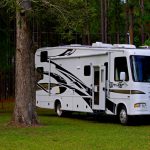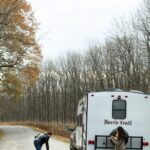At RV Brands™, we're all about experiencing new places, embracing a minimalist lifestyle, and connecting with nature. We know that living in an RV full time is a dream for many, but what about the downside? While we love the perks of RV living, we've also encountered some challenges along the way. In this comprehensive guide, we'll cover everything you need to know about the potential drawbacks of living in an RV full time. From financial considerations to practical challenges, we'll explore it all.
Pros and Cons of Living in an RV Full Time
Living in an RV full time has its perks, but there's also a downside. Here's what you need to know:
Pros
- Mobility: With an RV, you can take your home with you wherever you go. Whether you want to explore National Parks, stay near the beach, or travel to new cities, an RV provides ultimate mobility.
- Comforts of Home: With modern RVs, you can have all the amenities you need to feel comfortable on the road. From a full kitchen to a comfortable bed, RVs offer a sense of home while you're exploring new places.
- Flexibility: RV living offers ultimate flexibility. You can change your travel plans on a whim, stay as long or as short as you like in one place, and make adjustments as you go.
- Cost Savings: Depending on your lifestyle and travel plans, living in an RV full time can save you money on housing expenses, utilities, and maintenance.
- Closer to Nature: Living in an RV full time allows you to immerse yourself in the natural world. Whether you're parked in a forest or near a lake, you'll have easy access to the outdoors.
- Quality Time: With RV living, you can spend quality time with loved ones, whether it's your partner, children, or pets. You'll have the opportunity to create lasting memories and bond with those closest to you.
- Eco-Friendly Lifestyle: Living in an RV full time can be an eco-friendly lifestyle choice. With a smaller space, you'll consume less energy and use fewer resources.
- Minimalism: RV living forces you to pare down your possessions and embrace a more minimalist lifestyle. You'll learn to live with less and focus on experiences, rather than material possessions.
- Adventure and Experiences: Living in an RV full time opens up a world of adventure and experiences. From exploring new cities to meeting new people, RV living offers endless opportunities for adventure.
- Freedom: Perhaps most importantly, living in an RV full time offers ultimate freedom. You can go where you want, when you want, and enjoy life on your own terms.
Cons
- Lack of Space: RV living means living in a small space. Depending on the size of your RV and the number of people (and pets) living with you, space can be limited.
- Limited Storage: With limited space comes limited storage. This can be especially challenging if you're used to having a lot of possessions or if you're traveling with children.
- Weather: RV living means you're exposed to the elements. Whether it's extreme heat, cold, or wind, you'll need to be prepared for all types of weather.
- Temperature Fluctuations: RVs aren't always well-insulated, which means you'll feel the effects of fluctuating temperatures more acutely than you would in a traditional home.
- RV Maintenance: Like any vehicle, RVs require maintenance and repairs. This can be costly and time-consuming, especially if you're on the road when something breaks.
- RV Depreciation: RVs are a depreciating asset, which means they lose value over time. This can be a financial consideration if you plan to sell your RV down the line.
- Travel Days: While RV travel can be fun and exciting, it can also be tiring. Driving long distances, especially on unfamiliar roads, can be stressful and exhausting.
- Changing Routines: When you're living in an RV full time, your routines and habits can be disrupted. This can be challenging for some people, especially if you're used to a more structured lifestyle.
- Noise & Privacy Issues: RV living means living in close quarters with others. Depending on where you're parked, you may have to deal with noise and privacy issues from neighbors or passersby.
- Internet Access: While some RVs offer Wi-Fi and other means of connectivity, it can still be challenging to stay connected while on the road.
Is it Financially Smart to Live in an RV?
While RV living can save you money on housing expenses, it's not always the cheapest living option. You'll need to consider the cost of the RV itself, fuel costs, maintenance and repairs, campground fees, and more. According to a survey conducted by RVshare, the average cost of RV living is between $2,000 and $3,000 per month. However, this can vary widely depending on your lifestyle, travel plans, and the type of RV you choose.
Key Takeaway: RV living can be a cost-effective living option, but it's important to carefully consider all the associated costs.
Is it Practical to Live in an RV Full Time?
Living in an RV full time can be practical for some people, but it's not for everyone. If you're someone who enjoys stability, routine, and a more traditional lifestyle, RV living may not be the best fit. Additionally, if you're traveling with children or pets, you'll need to consider their needs as well. However, if you're someone who craves adventure, freedom, and the ability to travel on your own terms, RV living can be an incredibly fulfilling lifestyle choice.
Key Takeaway: RV living is practical for some, but not for everyone. Consider your own lifestyle and needs before making the decision to live in an RV full time.
How Much Does it Cost Monthly to Live in an RV Full Time?
As mentioned above, the cost of RV living can vary widely depending on a number of factors. However, according to a survey conducted by RVshare, the average cost of RV living is between $2,000 and $3,000 per month. This includes the cost of the RV itself, fuel costs, maintenance and repairs, campground fees, and more. However, it's important to note that your own monthly costs could be higher or lower depending on your lifestyle and travel plans.
Key Takeaway: The monthly cost of RV living varies widely, but the average is between $2,000 and $3,000.
Quick Tips and Facts
- TIP: Downsizing to a minimalist lifestyle can be challenging, but it's essential for RV living. Be prepared to donate or sell many of your possessions.
- TIP: If you plan to live in an RV full time, be prepared for unexpected repairs and maintenance costs. Budget accordingly.
- FACT: According to the RV Industry Association, there are currently more than 11.2 million households in the US that own an RV.
- FACT: RV travel is on the rise. According to a report by the RV Industry Association, sales of RVs increased by over 4% in 2021.
Conclusion
Living in an RV full time can be an exciting, fulfilling lifestyle choice. However, it's important to carefully consider the potential downsides, from financial considerations to practical challenges. Ultimately, whether or not RV living is right for you will depend on your own goals and lifestyle. If you're someone who craves adventure, independence, and the ability to travel on your own terms, RV living may be the perfect fit.
Ready to hit the road? Keep exploring the RV Brands™ site for more expert tips and advice on RV living.
References:
- RVshare. (n.d.). RV Costs: How Much Does it Cost to Rent an RV or Buy One? Retrieved from https://rvshare.com/rv/rv-rental-prices
- RV Industry Association. (2022). 2022 RV Industry Profile. Retrieved from





